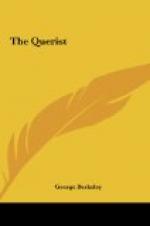140. Qu. Whether the promoting of industry should not be always in view, as the true and sole end, the rule and measure, of a national bank? And whether all deviations from that object should not be carefully avoided?
141. Qu. Whether a national bank may not prevent the drawing of specie out of the country (where it circulates in small payments), to be shut up in the chests of particular persons?
142. Qu. Whether it may not be useful, for supplying manufactures and trade with stock, for regulating exchange, for quickening commerce, for putting spirit into the people?
143. Qu. Whether tenants or debtors could have cause to complain of our monies being reduced to the English value if it were withal multiplied in the same, or in a greater proportion? and whether this would not be the consequence of a nation al bank?
144. Qu. If there be an open sure way to thrive, without hazard to ourselves or prejudice to our neighbours, what should hinder us from putting it in practice?
145. Qu. Whether in so numerous a Senate, as that of this kingdom, it may not be easie to find men of pure hands and clear heads fit to contrive and model a public bank?
146. Qu. Whether a view of the precipice be not sufficient, or whether we must tumble headlong before we are roused?
147. Qu. Whether in this drooping and dispirited country, men are quite awake?
148. Qu. Whether we are sufficiently sensible of the peculiar security there is in having a bank that consists of land and paper, one of which cannot be exported, and the other is in no danger of being exported?
149. Qu. Whether it be not delightful to complain? And whether there be not many who had rather utter their complaints than redress their evils?
150. Qu. Whether, if ‘the crown of the wise be their riches’ (Prov., xiv.24), we are not the foolishest people in Christendom?
151. Qu. Whether we have not all the while great civil as well as natural advantages?
152. Qu. Whether there be any people who have more leisure to cultivate the arts of peace, and study the public weal?
153. Qu. Whether other nations who enjoy any share of freedom, and have great objects in view, be not unavoidably embarrassed and distracted by factions? But whether we do not divide upon trifles, and whether our parties are not a burlesque upon politics?
154. Qu. Whether it be not an advantage that we are not embroiled in foreign affairs, that we hold not the balance of Europe, that we are protected by other fleets and armies, that it is the true interest of a powerful people, from whom we are descended, to guard us on all sides?
155. Qu. Whether England doth not really love us and wish well to us, as bone of her bone, and flesh of her flesh? And whether it be not our part to cultivate this love and affection all manner of ways?




